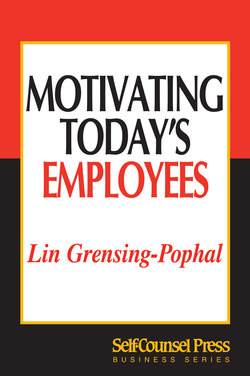Читать книгу Motivating Today's Employees - Lin Grensing-Pophal - Страница 24
На сайте Литреса книга снята с продажи.
3 What Motivates Employees?
ОглавлениеWhen Elaine was hired as a contract employee to do graphic design work for a small, privately held company, she looked forward to the opportunity to exhibit her creative skills. She didn’t expect, though, that she would be welcomed into the firm and considered part of the family. As she says, “I was shocked when my supervisor invited me to attend a department meeting — I assumed temps weren’t involved in those things. Then, at the meeting, I had the opportunity to give some pointers on a four-color process. That was motivating because I had the opportunity to show that I could contribute.”
Another woman shares an experience that she felt was especially motivating: “Out of the blue one day, the owner of the company came by and gave me a $75 bonus for working on a project. I bought a freezer from another employee with the money.”
Sue, a professional engineer, says that the most motivating thing to her is reporting to someone she respects — a mentor — and having that individual hand her new assignments. “I guess it conveys a level of trust,” she says. She adds though, that new assignments aren’t motivating if they come from individuals whom she doesn’t respect. “When it’s someone I look up to and whom I respect, it’s flattering to be chosen for an assignment. In other cases, it just seems like more work. It’s a subtle difference, I know, but it makes a difference to me.”
“These things have never happened to me, but they would be motivating,” says an employee who doesn’t feel particularly motivated all of the time. “It would be great if my manager would say, ‘Why don’t you pick out a career-building seminar this year and we’ll pick up the tab,’ or if the company president would casually stop by just to say, ‘Hey, thanks for your comment at the meeting today — you have some great ideas!’ ”
What motivates high performers? The answers may surprise you. It doesn’t always take money. It doesn’t always take grand gestures. Sometimes, as the not-so-motivated employee points out, all it takes is a simple pat on the back.
A study by Watson Wyatt of 551 large employers and more than 500 employees done in 2000 found that the majority of those responding — 81 percent — indicated that the “desire to maintain good work reputation” was “very significant” in terms of their motivation. Other motivations cited were “importance of the work” (76 percent), “appreciation of others” (66 percent), “interesting work” (51 percent), “personal desire to please supervisor” (20 percent), and “expectation of financial reward” (15 percent). Note that monetary reward was not the main driver that we often believe it to be.
